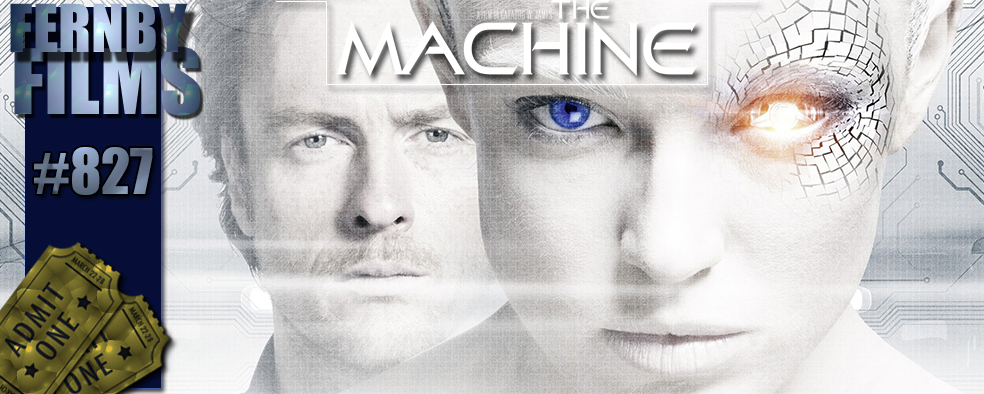Movie Review – Machine, The (2013)
This low-key thriller is well worth a look. It might not deliver the excitment of its big-budget bretheren, but it does more for human/cyborg relations (ha!) than Spielberg’s AI: Atrificial Intelligence ever achived, and is hugely thought provoking. While the ending feels little too “easy”, and the mid-section spends a fraction to long on the “meaning of life” stuff these human-to-cyborg films often lumber with, I really enjoyed The Machine for the film it is and wanted to be. An encumberance of budgetary constraints obviously reduced the scope of the film’s potential, but the story elicited enough excitement to carry things off.
– Summary –
Director : Caradog James
Year Of Release : 2013
Principal Cast : Caity Lotz, Sam Hazeldine, Toby Stephens, Pooneh Hajimohammadi, Denis Lawson.
Approx Running Time : 91 Minutes
Synopsis: A brilliant computer scientist, searching for a solution to artificial intelligence technology to aide his afflicted daughter, works for the MOD for a way to return solders to combat states after severe brain injuries. He teams with a female scientist for help, but after she’s killed by Chinese rebels, decides to use her as a template for a new form of cyborg.
What we think : This low-key thriller is well worth a look. It might not deliver the excitement of its big-budget brethren, but it does more for human/cyborg relations (ha!) than Spielberg’s AI: Artificial Intelligence ever achieved, and is hugely thought provoking. While the ending feels little too “easy”, and the mid-section spends a fraction to long on the “meaning of life” stuff these human-to-cyborg films often lumber with, I really enjoyed The Machine for the film it is and wanted to be. An encumbrance of budgetary constraints obviously reduced the scope of the film’s potential, but the story elicited enough excitement to carry things off.
**********************
Do cyborgs need genitalia?
The idea of artificial intelligence has been mined by Hollywood and humanity for books, films and television since the idea first came into being back when computers became a thing. It regained exceptional prominence in James Cameron’s Terminator franchise (the end of humanity rode off the back of a self-aware computer), and has been a staple of modern sci-fi ever since, not the least through the presence of Commander Data in The Next Generation segment of the Star Trek universe. From low-budget rubbish to high-end blockbusters, artificial intelligence has almost become a cliched shorthand for science fiction to mirror humanity’s flaws and successes. The Machine, much like the title might suggest, features a humanistic cyborg created out of carnage, a cyborg designed to fill a need by the Ministry of Defense (it’s a British thing), and as you’d expect, the themes of what it means to be truly human are once again explored (although not in exacting detail, strangely).
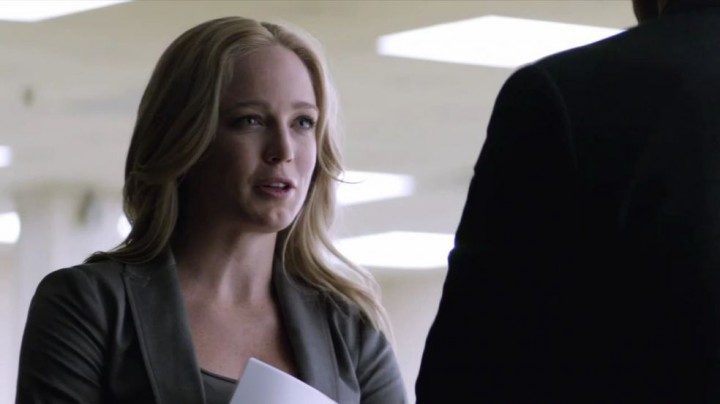
In the future, the West is engaged in a new Cold War with China – military advancements are paramount to both Governments. Hidden deep beneath the Earth, in a super-secret laboratory for the Ministry of Defense, a neuroscientist, Vincent McCarthy (Toby Stephens) is working on advanced artificial intelligent technology to help rebuild severely injured soldiers. He is partnered with a fellow science boffin, Ava (Caity Lotz), and although Ave becomes aware that all is not right (or black and white) in the installation – there are hints that many of the “patients” being experimented on are being held against their will – when she is murdered by Chinese spies Vincent builds a cyborg replica of her. Vincent’s daughter is afflicted with a degenerative brain disease, and he is hoping to use this technology to somehow restore her cognitive function to where it should be. Vincent’s other test subject, a double-amputee named James (Sam Hazeldine), is given new arms as part of the experimentation, and is able to feel and touch once more for the firt time in many years. Naturally, the MOD are both wary of Vincent’s tech, and covetous of it, although the dark motivations of resident MOD official Thomson (Denis Lawson) cloud everyone’s judgement.
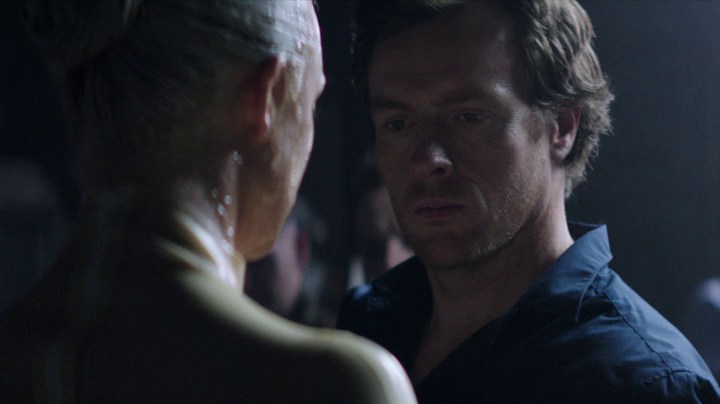
I really enjoyed The Machine. As far as concepts and ideas go, there’s more here than any normal film would even attempt to get into, and you get the sense that the subtext and foundational work here is actually more developed than the story at the forefront! There are little hints and tidbits, little effects and story moments that speak of a larger universe at play – The Machine sometimes feels like it’s skimming the surface of its own potential; one might hope for a sequel or spin-off, but considering the relative lack of success this film has had, it would be an extreme long-shot at best were that to occur. The Machine’s narrative is nothing new, nor does it delve into areas of human sense of self that haven’t been covered in other movies, rather it mixes and stirs the broth of sci-fi convention to create something that feels fresh out of reconstituted material – somewhat apropos considering the film is about reconstituted materials.
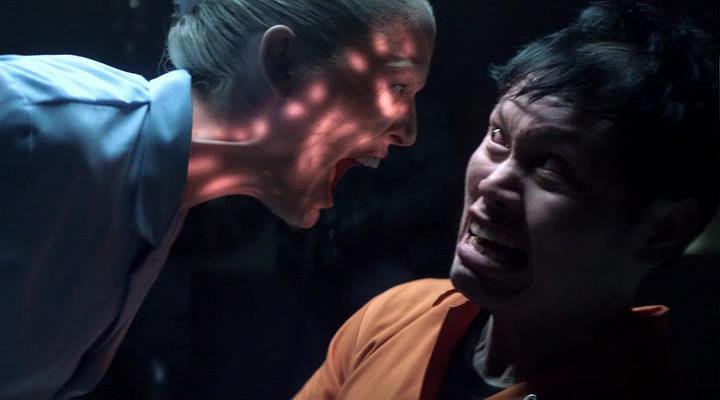
The Machine boasts a fairly pop-culture-cool cast. Toby Stephens, whom most people will be familiar with as the man Big Bad in Pierce Brosnan’s final Bond adventure, Die Another Day, does a nice job as Vincent, although he’s far from challenged as an actor in what is, essentially, a mad-scientist Doctor Frankenstein cliche. Caity Lotz, who currently appears in The WB’s mega-hit series Arrow (as the Black Canary) is tasked with being the emotionless-yet-soulful automaton Ava, and aside from spending a fair portion of the film with no clothes on (or at least nude-in-silhouette), is good as the cyborg construct Vincent creates. Sam Hazeldine, who appeared alongside Benicio del Toro in The Wolfman, paired with John Cusack in The Raven, and as part of George Clooney’s The Monuments Men, looks more of a grungier, less-Hugh-Jackman-like Wolverine, and provides an extra pair of fists (ha!) when the proverbial hits the fan. Don’t forget fan-favorite Denis Lawson – he played the popular Wedge Antilles in the original Star Wars trilogy – popping in here as chief villain Thomson, adding the best of British malice and subversion in the role.
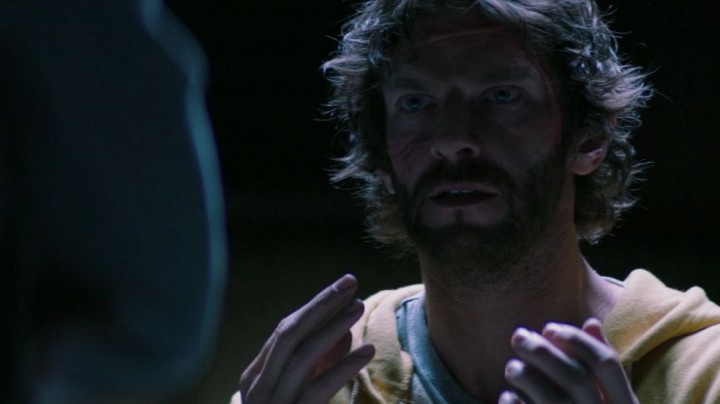
Probably the most jaw-dropping part about The Machine is its deft use of some superb visual effects, particularly the creation and propagation of Ava. The effects used to bring her to life are exquisitely rendered, from her construction via red fleshy fluid, to her inner “glow” when she hits an emotional beat; big props to the guys who worked on all the visual effects in this film, because it truly is a seamless and visceral experience. In much the same way that Robin Williams’ robotic lifeform in Bicentennial Man suited the tone and style of that film, here, Ava fits into this dark, shadowy world of science and life, a unique virginal force within a world designed to snuff it out. The film feels like a mesh between Januz Kaminski’s glowing cinematography (I hate to repeat myself, but this film could well have been a sequel to AI: Artificial Intelligence from a visual perspective) and David Fincher’s Fight Club grittiness, and the end result is a wonderful, grubbily sly tone that permeates every aspect of this movie.
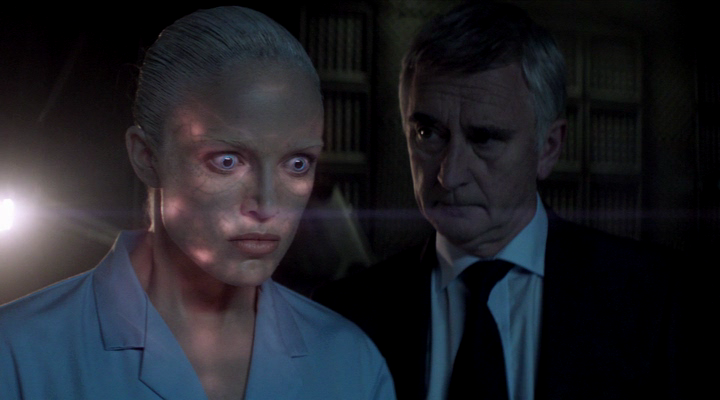
The Machine packs a wallop with ideas, but struggles to escape its genre thanks to a budgetary restricted setting and an inability to truly transcend the confines of its self-imposed inward-focused narrative. If you’re looking for a film that will ask you to expend some brain cells thinking about things, this film comes thoroughly recommended, but I get the sense that casual viewers who think they’re buying into some action-extravaganza or sci-fi epic might feel miffed at just how low-key this thing really is. Is it good? Yes. It is great? Almost. As a fan, I bought into it, but if you’re not a sci-fi nerd, then you’re gonna struggle here.


